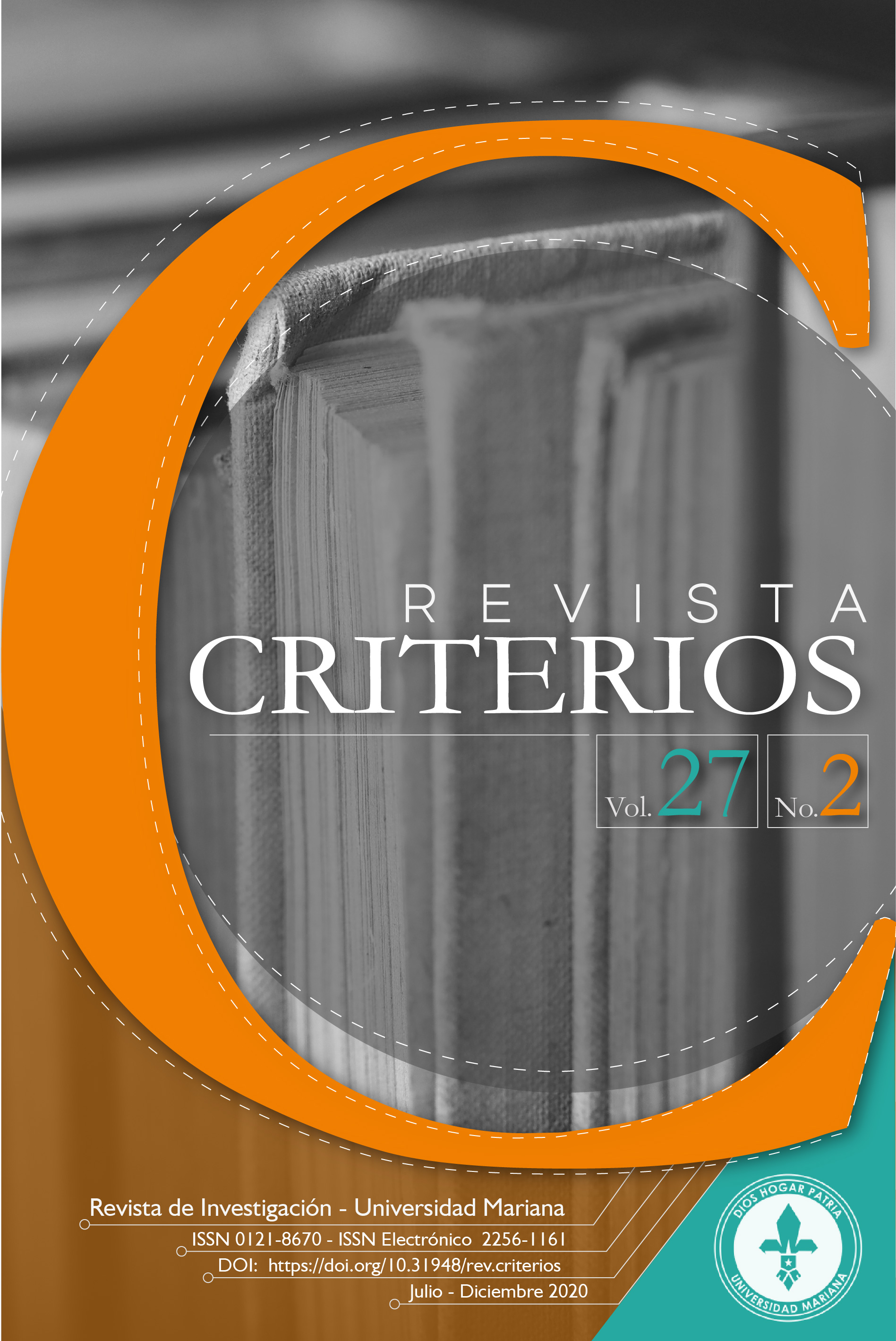Estimation of the result of the Pre-ICFES drill and its impact on the Saber 11 Test - 2018 of students of the Santander General Educational Institution
DOI:
https://doi.org/10.31948/rev.criterios/27.2-art8Keywords:
academic performance, quality of education, comparative evaluation, educational evaluationAbstract
The objective of this research was to evaluate whether or not there is an incidence between the overall result and the result between the critical reading, mathematics, social sciences, natural sciences and English tests of the Pre-ICFES simulation, with the result obtained by the students in the Saber 11 Test of 2018 at the Santander General Educational Institution in the municipality of Soacha, Cundinamarca. We handled an intra-subjects or repeated measures design and a two-factor model, both with repeated measures. For their study, the ANOVA was used for repeated measures to analyze if there is contrast of means for related data (dependent or paired). From the statistical analysis of the results of the Pre-ICFES and the Saber 11 Test, it was possible to demonstrate that the Pre-ICFES tool potentiated both the overall results and the results of each subject by the students.
Author Biography
Jorge Enrique Díaz-Pinzón, Secretaría de Educación y Cultura Municipio de Soacha
Magíster en Gestión de la Tecnología Educativa. UDES. Docente de matemáticas e investigador.
References
Chica, S., Galvis, D. y Ramírez, A. (2009). Determinantes del rendimiento académico en Colombia: pPuebas ICFES Saber 11º, 2009. http://publicaciones.eafit.edu.co/index.php/revista-universidad-eafit/article/view/754
Congreso de la República de Colombia. (2009). Ley 1324 de 2009 “por la cual se fija parámetros y criterios para organizar el sistema de evaluación de resultados de la calidad de la educación, se dicta normas para el fomento de una cultura de la evaluación, en procura de facilitar la inspección y vigilancia del Estado y se transforma el ICFES”. https://www.mineducacion.gov.co/1621/article-210697.html
Camacho, C. (s.f.). Análisis de la varianza para medidas repetidas. personal.us.es/vararey/adatos2/materiales/anovarepe.pdf
Díaz-Pinzón, J.E. (2016). Soporte técnico de simulación Phet en la enseñanza y aprendizaje de fracciones equivalentes. Revista de Investigaciones Universidad del Quindío, 28(2). 31-41. https://doi.org/10.33975/riuq.vol28n2.6
Díaz-Pinzón, J.E. (2017). Correlación y regresión lineal de la evaluación tiempo y puntaje con recurso interactivo flash. INNOVA Research Journal, 2(10), 1-8. https://doi.org/10.33890/innova.v2.n10.2017
Díaz-Pinzón, J.E. (2020a). Uso de modelo predictivo para la dinámica de transmisión del COVID-19 en Colombia. Revista Repertorio de Medicina y Cirugía, 29(Núm. Supl.1), 34- 44. https://doi.org/10.31260/RepertMedCir.01217372.1056
Díaz-Pinzón, J.E. (2020b). Estudio de los resultados del contagio por COVID-19 a nivel mundial. Revista Repertorio de Medicina y Cirugía, 29(Núm. Supl.1), 65-71. https://doi.org/10.31260/RepertMedCir.01217372.1089
Díaz-Pinzón, J.E. (2020c). Estudio comparativo entre el contagio durante la cuarentena obligada por el COVID-19 y el contagio durante la apertura gradual y controlada para algunos sectores de la economía en Colombia. Revista Repertorio de Medicina y Cirugía, 29(1), 52-58. https://doi.org/10.31260/RepertMedCir.01217372.1073
Díaz-Pinzón, J.E. (2020d). Aplicación de Olimpiadas Matemáticas en la Institución Educativa General Santander. Revista Fedumar Pedagogía y Educación, 7(1), 237-251. https://doi.org/10.31948/10.31948/rev.fedumar7-1.art13
Hernández, R., Fernández, C. y Baptista, P. (2014). Metodología de la investigación (6.a ed.). McGraw-Hill / Interamericana Editores, S.A. de C.V.
Instituto Colombiano para la Evaluación de la Educación Superior (ICFES). (2017). Guía de Orientación Saber 11. www.icfes.gov.co/...y.../saber-11/...saber-11/...saber-11/...saber-11.../file?...
Ministerio de Educación Nacional (MEN). (2010). Pruebas Saber. http://www.mineducacion.gov.co/1759/w3-article-244735.html
Navarro, J. (2013). Efectos académicos de las pruebas Saber 11º en las instituciones educativas del departamento de Córdoba: una perspectiva de gestión. Actualidades Pedagógicas, (62), 109-126. https://doi.org/10.19052/ap.2274
Pascual, J., Frías, M. y García, J. (1996). Manual de psicología experimental: Metodología de investigación. Editorial Ariel.
Potts, C. (2020). Modelo computarizado del coronavirus: “Los asintomáticos son el gran riesgo”. https://www.dw.com/es/modelo-computarizado-del-coronavirus-los-asintom%C3%A1ticos-son-el-gran-riesgo/a-5279833
Sánchez, L. y Muñoz, N. (2014). Prepárate divertidamente para las pruebas saber (Trabajo de Grado). Universidad Católica de Manizales. http://repositorio.ucm.edu.co:8080/jspui/bitstream/handle/10839/994/Nancy%20Liliana%20Munoz%20Betancurth.pdf?sequence=1&isAllowed=y
Universidad del Norte. (UNINORTE). (2015). Propuesta de Evaluación con Carácter Diagnóstico Formativa – ECDF. http://aprende.colombiaaprende.edu.co/sites/all/modules/mapa/docs/curso_ECDF/UNINORTE_curso%20ECDF.pdf
Rodríguez, M. (2001). Análisis de Varianza Simple (o con un factor). https://rua.ua.es/dspace/bitstream/10045/12081/1/Capitulo11.pdf
Siamu. (2013). Anova con medidas repetidas. https://es.calameo.com/books/002446339cbdec153f084
Shuttleworth, M. (2008). Diseño de la Investigación Cuantitativa. https://explorable.com/es/diseno-de-la-investigacion-cuantitativa
How to Cite
Downloads
Downloads
Published
Issue
Section
License

This work is licensed under a Creative Commons Attribution 4.0 International License.
Revista Criterios es publicada por la Editorial UNIMAR de la Universidad Mariana bajo los términos de la licencia Creative Commons Reconocimiento 4.0 Internacional (CC BY 4.0)

| Article metrics | |
|---|---|
| Abstract views | |
| Galley vies | |
| PDF Views | |
| HTML views | |
| Other views | |








